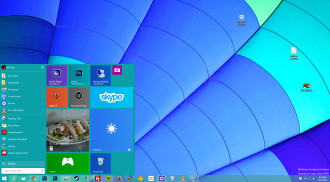Tag: Android
Android to swamp 2015 smartphone market
 Next year could see the rise of the new Android defeating platforms, according to new research.
Next year could see the rise of the new Android defeating platforms, according to new research.
Sales of smartphones based on newly emerging platforms, including Android One, Firefox OS and Tizen, are expected to increase significantly in 2015.
According to beancounters at Gartner, the ratio of feature phones to total global handset shipments already dropped to 34 percent in the third quarter of 2014 and is expected to dip to as low as 10 percent in 2018.
The narrowing price gap between smartphones and feature phones is the main reason for feature phone subscribers to switch to smartphones.
Microsoft Mobile’s decision to phase out its feature phones has also encouraged handset makers to roll out more Android One-, Firefox- and Tizen-based models, priced from$50-100, to cash in.
Mozilla teamed up with China-based handset makers including TCL, ZTE, Huawei as well as chipset vendor Spreadtrum Communications to form a supply chain for Firefox smartphones.
In cooperation with regional telecom operators, the Firefox supply chain has launched 14 models in 30 markets. Some Firefox models available in the Philippines and India are even priced below US$30.
In reply, Google has been promoting Android One smartphones and with Micromax to promote Android One smartphones in India and chipset vendors Qualcomm and MediaTek and handset vendors HTC, Asustek Computer, Acer and Lenovo to develop next generation Android One phones, which are expected to come in the first half of 2015.
But it faces some competition from Samsung with its first Tizen-based smartphone, the Z1, in early 2015. The Z1 is expected to come with a 4-inch display, 1.2 GHz dual-core processor and priced below US$100.
Daft patent war averted
 What was shaping up to be the daftest and most expensive patent war in history has been averted.
What was shaping up to be the daftest and most expensive patent war in history has been averted.
Apple and Microsoft had teamed up to form a super patent troll called the Rockstar Consortium in a bid to take out Android. The Troll outbid Google, Intel – and a few others – in buying thousands of Nortel patents.
The “Rockstar Consortium” was not subject to promises that Apple and Microsoft initially made to license the patents under reasonable terms and launched its patent attack on Android last year.
It seems that a a settlement of sorts has been reached. Rockstar has agreed to sell its patents to RPX (with Google and Cisco picking up much of the bill). RPX has so far been a “good guy” in that it collects patents to stop trolling.
It’s making sure that basically anyone can license these patents under FRAND (fair and reasonable, non-discriminatory) rates. The price being paid is approximately $900 million.
This is considerably less than the $4.5 billion Microsoft and Apple paid but this was for only 4,000 of the 6,000 patents. It is safe to assume that Apple and Microsoft kept the 2,000 valuable patents.
Google and Cisco will license these patents to stop the majority of the lawsuits and can defend themselves if they feel threatened.
Cisco’s Mark Chandler celebrated the deal as a “common sense” solution. And, it certainly beats all out patent litigation war. But it’s still just about moving money around, rather than encouraging innovation. He notes that in settling this as a group, it helps keep things from getting totally out of control.
Windows 10 is delayed again
 People eager to throw off the shackles of Windows 8.x look like they’ll have some time to wait before they’re free at last.
People eager to throw off the shackles of Windows 8.x look like they’ll have some time to wait before they’re free at last.
According to PC Advisor, a “consumer preview2 will be released in January so you’ll be able to see what you’re missing for quite a long time. Windows 10 isn’t now expected until the second half of next year.
Reuters, quoting Microsoft’s chief operating officer, Kevin Turner, said the launch was likely to be the early Autumn.
Reports suggest that Windows 10 may well be free of charge to existing Windows 8.x users. Microsoft isn’t giving any details of prices yet and so no one is clear what the upgrade paths are likely to be.
The operating system is likely to look more like Windows 7 than Windows 8.x – the latter was Microsoft’s ill fated attempt to resemble other tablet operating systems like iOS and Android.
Even Microsoft insiders wondered what the company was doing with such a hybrid.
Microsoft’s decision to skip the number nine and jump straight to Windows 10 seems to be some kind of weird marketing move – as usual, it is describing the future OS as the “best OS yet”.
Android Trojan could be bane of corporations
 One of the longest running multipurpose mobile botnets has been updated to become stealthier and more resilient and it could be a major headache for businesses.
One of the longest running multipurpose mobile botnets has been updated to become stealthier and more resilient and it could be a major headache for businesses.
Dubbed NotCompatible, the botnet is mainly used for instant message spam and rogue ticket purchases, but it could be used to launch targeted attacks against corporate networks because the malware allows attackers to use the infected devices as proxies.
Researchers from security firm Lookout said that the mobile Trojan was discovered in 2012 and was the first Android malware to be distributed as a drive-by download from compromised websites.
Devices visiting such sites would automatically start downloading a malicious Android application package file. Users would then see notifications about the finished downloads and would click on them, prompting the malicious application to install if their devices had the “unknown sources” setting enabled.
A newly found version of the Trojan program, called NotCompatible.C, encrypts its communications with the C&C servers, making the traffic indistinguishable from legitimate SSL, SSH or VPN traffic.
Lookout security researchers wrote in their bog that the malware can also communicate with other infected devices directly, forming a peer-to-peer network that offers powerful redundancy in case the main C&C servers are shut down.
The Lookout researchers believe that the botnet is likely rented to other cybercriminals for different activities and the Trojan’s proxy capability makes it a potential threat to corporates.
If a device infected with NotCompatible.C is brought into an organisation, it could give the botnet’s operators access to that organisation’s network, the Lookout researchers said.
“Using the NotCompatible proxy, an attacker could potentially do anything from enumerating vulnerable hosts inside the network, to exploiting vulnerabilities and search for exposed data.”
“We believe that NotCompatible is already present on many corporate networks because we have observed, via Lookout’s user base, hundreds of corporate networks with devices that have encountered NotCompatible,” the Lookout researchers said.
Ah, the unternet of thangs ain’t what they used to be.
Android open source project falters
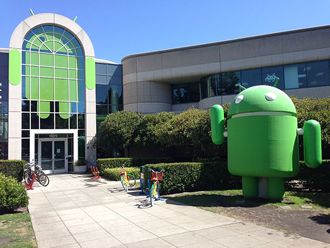 While Android Open Source Project (AOSP) smartphone growth was a staggering 211 percent in 2013, things are slowing right down, and a projection is growth will fall to 18 percent in 2015.
While Android Open Source Project (AOSP) smartphone growth was a staggering 211 percent in 2013, things are slowing right down, and a projection is growth will fall to 18 percent in 2015.
ABI Research said the previous growth figures were driven by the rise of Indian and Chinese handset vendors targeted at the domestic market, growth in the Chinese market is slowing.
And Google’s Android One move is attracting Indian manufacturers to become members of the certified Android camp, said Nick Spencer, an analyst of mobile devices at ABI.
He said that Google had engaged with chipset vendors such as Qualcomm and Mediatek to put together an Android One low cost reference design, the search corporation is worried about its market becoming too fragmented.
Android One is set to push Google’s attempt to commoditise the smartphone market, but AOSP is a threat to its own mobile strategy, showing that you can sometimes create too many initiatives and confuse your customers.
ABI has provided a table showing smartphone unit shipments by operating system:
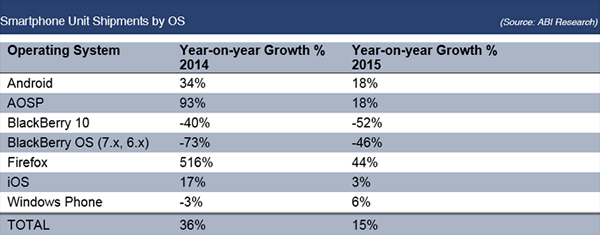
Samsung cannot stop Microsoft
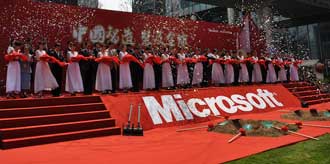 A US judge has rejected Samsung bid to put Microsoft’s smartphone patent royalties case on hold while the South Korean company pursues arbitration in Hong Kong.
A US judge has rejected Samsung bid to put Microsoft’s smartphone patent royalties case on hold while the South Korean company pursues arbitration in Hong Kong.
New York Judge Jed Rakoff said the lawsuit would proceed despite the arbitration.
Microsoft sued Samsung in August, claiming it broke a collaboration agreement by refusing to make royalty payments after the US company announced its intention to buy Nokia’s handset business in September 2013.
The lawsuit claimed Samsung owed $6.9 million in interest on more than $1 billion in patent royalties it delayed paying. Samsung said that the Nokia acquisition in April violated its 2011 deal with Microsoft.
Samsung has gone to arbitration at the Hong Kong office of the International Court of Arbitration of the International Chamber of Commerce.
Samsung had agreed in 2011 to pay Microsoft royalties in exchange for a patent license covering phones that ran Google Android operating system.
Samsung also agreed to develop Windows phones and share confidential business information with Microsoft, according to the filing.
But once Microsoft acquired Nokia, it became a direct hardware competitor with Samsung, the filing said, and Samsung refused to share some sensitive information due to antitrust concerns.
Microsoft pushes Office for iPad
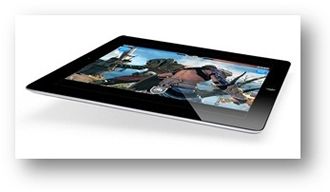 In either a sign of desperation or a sign of largesse, Microsoft said today it will let people using the Apple Pad make and edit documents for free instead of paying through the nose.
In either a sign of desperation or a sign of largesse, Microsoft said today it will let people using the Apple Pad make and edit documents for free instead of paying through the nose.
Microsoft wants its software to be pervasive across every gadget and gizmo as the world has opened up to applications that don’t need an expensive PC or a pricey Windows operating system to work.
Microsoft already started to offer Office for the iPad and is understood to have attracted some 10s of millions to the proposition.
And in a further move it wants Apple users on its side, it said it will release Powerpoint, Excel and Word apps not only for the iPhone but for the Android operating system later this year too.
Apps for mobile devices cost only pounds rather than hundreds of pounds but it’s not entirely clear what CEO Satya Nadella’s motives are in spreading the Word around.
Android creator walks from Google
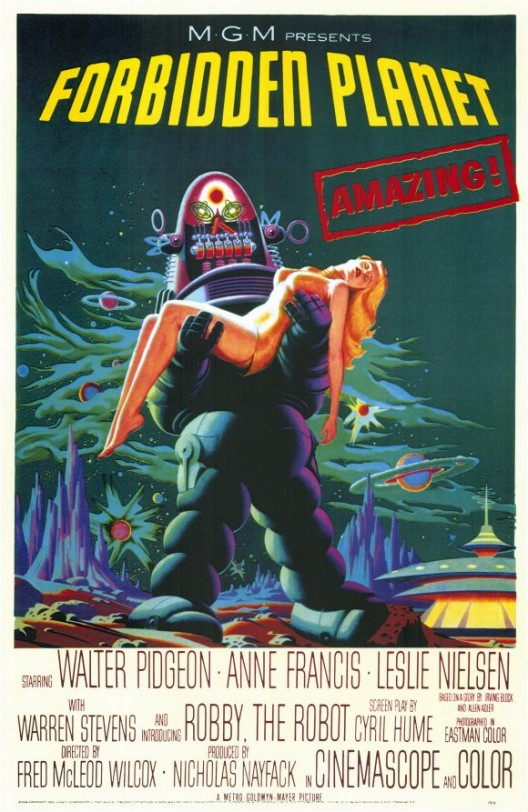 Andy Rubin, co-founder of the Android mobile business and head of its robotics effort is leaving Google.
Andy Rubin, co-founder of the Android mobile business and head of its robotics effort is leaving Google.
According to a statement from Google, Rubin will start a company to support startups interested in building technology-hardware products.
It is possible that Rubin is getting a little bored. Last year, Google’s browser and applications chief Sundar Pichai replaced Rubin as head of the Android division, bringing the firm’s mobile software, applications and Chrome browser under one roof.
Android was pretty much Rubin’s baby having built it into a free, open-source software platform now used by most of the world’s largest handset manufacturers. He switched from that role to lead a series of robotics acquisitions for Google in 2013.
Word on the street is that Rubin likes to run his own show and was facing constraints on his activities at Google. However, Rubin himself has said that he did not really have any problems with independence at Google and left because he wanted to do something new on his own.
Google wants us to lick its lollipop
 Google has released a major update of Android, dubbed “Lollipop”.
Google has released a major update of Android, dubbed “Lollipop”.
According to Google, this is its thirteenth and most ambitious release of Android.
It has over 5,000 new application program interfaces (APIs) and to work on all devices.
Lollipop, it says, has a consistent design across different devices. It also has features that lets you filter notifications so that if you’re doing something and you don’t want to be disturbed, you’ll see only the people you decide to let through.
It also includes a new battery saver feature which it claims will extend the life of a gadget by up to 90 minutes. Android 5.0 Lollipop also now includes multiple user accounts, guest user mode, and PIN passwords.
Android faces smartwatch challenge
 No one is entirely sure how succcessful smartwaches can be and the jury is still out on the matter.
No one is entirely sure how succcessful smartwaches can be and the jury is still out on the matter.
But market research company ABI Research believes that after Apple releases its smartwatch in 2015, Android will face a real challenge.
ABI predicts that Android’s market share for smartwatches will drop below 50 percent, while iOS is likely to take 50 percent of the market.
The market for such devices is still quite small – Thomas McCourtie, an analyst at ABI said that by the end of this year there will be six million Android wearable devices shipped and that will rise to 15 million in 2015.
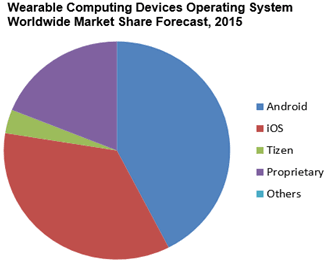 He said: “Judging by the previous sales performance of newly released Apple products, we anticipate a high number of sales of the Apple watch upon its initial release. The high number of loyal and affluent multiple Apple device owners alone will drive significant number of sales.”
He said: “Judging by the previous sales performance of newly released Apple products, we anticipate a high number of sales of the Apple watch upon its initial release. The high number of loyal and affluent multiple Apple device owners alone will drive significant number of sales.”
This pie chart shows what he believes will be the market share in the wearable market next year.
Google avoids Texas patent troll fight
 Google has managed to avoid having to fight patent troll Rockstar Consortium in a Texas court that lawyers consider nicer toward plaintiffs
Google has managed to avoid having to fight patent troll Rockstar Consortium in a Texas court that lawyers consider nicer toward plaintiffs
The US Court of Appeals for the Federal Circuit on Thursday ordered proceedings stayed in Texas over whether handsets made by Samsung Electronics, HTC, AsuSTEK, LG Electronics and ZTE infringed on Rockstar’s patents because they used Google’s Android.
Rockstar had filed the lawsuits in a Texas federal court and Google filed a lawsuit in northern California in which it asked a judge to rule that devices using the Android platform had not infringed the patents cited by Rockstar.
The overlaps led the appeals court to rule that the spat should be decided first in California.
The court said that there was no need to proceed with the five Texas actions because the one California action would do. “There will be substantial similarity involving the infringement and invalidity issues in all the cases”, whatever that means.
Rockstar which as Apple as an investor, outbid Google and paid $4.5 billion for thousands of former Nortel Network patents as the networking products supplier went bankrupt in 2011.
Google to gobble up smartphone market
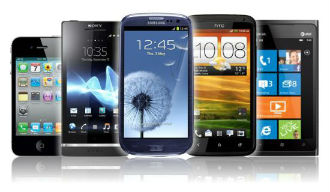 Want an Android smartphone for around 100 bucks? Go to India, because that’s where the action is.
Want an Android smartphone for around 100 bucks? Go to India, because that’s where the action is.
Market analysts at IDC said Google has introduced what it describes as the “first wave” of Android One devices in India in collaboration with local gizmo makers Spice, Karbonn and Micromax.
Google – now it’s a hardware company – has produced a reference design that makes it nice and easy to create devices using Mediatek MT6582 system on a chip (SoC) devices.
And Google isn’t letting it end there because it’s already teamed up major mobile firms Airtel and Reliance and pulled in Amazon too to give added value to the reference designs.
According to IDC, it won’t end there, because after capturing the Indian smartphone market it will also launch similar products in Indonesia and then Brazil.
IDC thinks Google is set to sell heaps of phones and “redefine” cheap smartphones with “good enough” specs.
OK – Samsung and Apple can battle it out at the high end and while there are plenty of Indian folk who can afford to lash out on these, there are an awful lot more folks who, quite simply, can’t.
Google hasn’t got a presence in the Chinese market, said IDC, but can make gazillions out of other major markets.
Samsung, Microsoft argue over the best city in the world
 Microsoft and Samsung cannot agree on the best city in the world to hatch out peace. Samsung thinks that Hong Kong is the best while Microsoft believes that it should be New York.
Microsoft and Samsung cannot agree on the best city in the world to hatch out peace. Samsung thinks that Hong Kong is the best while Microsoft believes that it should be New York.
Samsung has started an arbitration proceeding in Hong Kong against Microsoft as the Seattle behemoth attempts to give it a Chinese burn over smartphone patent royalties.
The arbitration was disclosed in a court filing as part of a federal lawsuit Microsoft filed in August in New York accusing Samsung of refusing to make royalty payments to Microsoft after the software company announced its intention to acquire Nokia’s handset business.
Samsung specifically wanted the Hong Kong office of the International Court of Arbitration of the International Chamber of Commerce. It is not clear why Hong Kong was chosen – perhaps it was the good shopping, better access to Dim Sung, pork in a bun and the students revolting.
The arbitration was started under the terms of a business collaboration agreement “to resolve a dispute concerning the calculation of success credits under that agreement,” Samsung said.
Jennifer Crider, a spokeswoman for Microsoft, said the companies’ contract provided that the “appropriate venue to interpret the business collaboration agreement is New York”. After all, if they could make an arbitration there, they could make it anywhere and they could go all through the night because the city never sleeps.
The arbitration came just days after Microsoft filed an amended complaint in its New York lawsuit asking the court to rule that it did not breach a business collaboration agreement with Samsung.
Microsoft in the complaint also wants Samsung to pay $6.9 million interest on more than $1 billion in royalty payments which it delayed in protest of the Nokia deal.
Microsoft claims Google Android mobile system uses some of its technology, and most hardware makers, including Samsung, have agreed to pay patent royalties on Android handsets.
Motorola Google said no and has been in litigation against Microsoft since 2010.
Amazon introduces more tablets
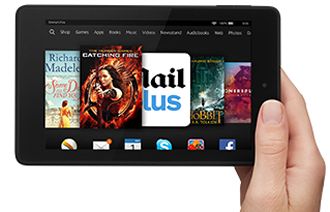 Internet giant Amazon announced the Fire HD6 tablet, at a price of £79 for the base model. It also introduced the Fire HDX8.9 at £329, and two Kindles.
Internet giant Amazon announced the Fire HD6 tablet, at a price of £79 for the base model. It also introduced the Fire HDX8.9 at £329, and two Kindles.
The cheap and cheerful Fire HD6 comes in two configurations, an 8GB and a 16GB version – the latter costs £99.
The device comes in a range of five colours, uses a 1.5GHz quad core processor, a six inch HD display, and front and rear cameras.
It also includes unlimited cloud storage for photos taken with all of its Fire devices. It gives access to Android apps and is compatible with most of the digital content on the interweb.
The device weighs 290 grams and has a claimed battery life of eight hours. Full charge via a micro USB port – supplied in the box – takes six hours.
It also has a Slimport USB 2.0 microB connector that lets you plug it into HDTV or VGA monitors or to PCs and Macs.
The Fire HD6 has a limited guarantee of a year.
The Kindle comes with touch now and costs £59, while the Kindle Voyage costs from £169.
